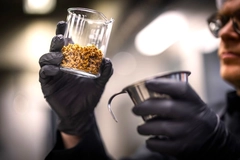
- Industry news
Industry news
- Category news
Category news
- Reports
- Key trends
- Multimedia
- Journal
- Events
- Suppliers
- Home
- Industry news
Industry news
- Category news
Category news
- Reports
- Key trends
- Multimedia
- Events
- Suppliers

Meanwhile Arla Foods Ingredients has also reported that it is setting up an ingredients production for the ice-cream industry in partnership with a French dairy company, Euroserum.
31/10/08 Arla Foods Ingredients aims to double sales of powdered whey protein and become global market leader by 2013. The move is part of a new global expansion strategy for Arlas. High on the agenda is the setting up of local production in the United States. Meanwhile Arla Foods Ingredients has also reported that it is setting up an ingredients production for the ice-cream industry in partnership with a French dairy company, Euroserum.

Extracting protein from whey – the product left over from cheese production – is good business. Whey protein has many positive properties and various added value protein products from Arla Foods Ingredients are included in ice cream, yogurt, infant formula, dietary supplements for sports people or the sick, bakery products, snacks and many other food products across the world.
After several years of growth, this business area is one of Arla’s most profitable. In fact, the food industry’s whey protein requirements will continue to rise. In other words, an already profitable business has significant potential to become even more profitable and contribute to the milk price paid to co-operative members.
Whey from Arla’s cheese production in Denmark and Sweden is fully utilised and processed into a variety of whey protein products at the Denmark Protein Factory at Nr. Vium in Jutland. Some whey protein pro-duction also takes place at Arla’s part-owned companies, Afisa in Argentina and Biolac in Germany. Arla Foods Ingredients has also started a partnership with the Norwegian dairy company Tine and with Eurose-rum in France for the production and sale of whey powder.
Arla said that the key is to improve access to whey because without the raw material they will fail to exploit the huge potential in the markets. One of Arla Foods Ingredients’ immediate tasks is to focus on the United States, the world’s largest whey protein market, and the aim is to establish local production before 2013. Arla Foods Ingredients, however, wants to access more whey in Europe and more partnerships are expected along the lines of those already in existence in Norway and France.
Innovation continues to be an important part of the work aimed at developing new ingredients, which meet customers’ requirements and contribute to innovative foods.
In the past, the by-product whey was dried and sold cheaply as animal feed. Today the proteins are ex-tracted and processed into various ingredients that can give cakes a fine structure, make yoghurt creamy and give infant formula a high nutritional content. Through innovation and research, the by-product has become highly valuable.
It is the proteins that are the most valuable while the whey contains primarily lactose. The lactose is dried and sold as ingredients to the bakery industry. A large proportion of the lactose in the whey is, how-ever, still used for animal feed, but the aim is to develop more added value powder products that are more profitable.
“Obviously our high ambitions are a positive thing and I hope and believe that this will be a source of inspiration. At the same time, however, this requires us to adapt the organisation in order to be able to handle the strong growth with all that this entails. It will be a real challenge,” says Executive Director Jais Valeur, Global Ingredients.
“The “Closer to Nature” concept is a perfect match for us. A strong logo, which is perceived positively, is good for us because the logo appears on all our products. Our customers value the fact that we represent quality, sustainability and naturalness. And our position is, to a large extent, natural. To put it simply, we use a sieve – a highly advanced sieve – when we filter the whey and extract the proteins.”
First and foremost the strategy is about strong brands and added value products, but Arla Foods will also always produce and sell bulk products because we are a co-operative with a duty to receive Danish and Swedish dairy farmers’ milk. Consequently, bulk production is one way of using all the milk, even when milk sourcing is at its peak as, of course, it fluctuates during the year.
Trading, the department in Global Ingredients that handles this business, is therefore an important part of the strategy. The aim is to have the most cost-effective production and sales organisation for whole milk powder and mozzarella.
Arla Foods has an Ingredients team in the UK as well, which sells bulk cream, butter and milk powder.
Arla Foods Ingredients will also start up an ingredients production for the ice-cream industry in partnership with a French dairy company, Euroserum.
“We have signed a strategic partnership which we have high hopes for,” says Valeur. “Euroserum has access to large volumes of whey. With our expertise within whey proteins, we can contribute to processing this whey into a profitable product.”
Initially, the partnership will focus on ingredients for the ice-cream industry, but in the longer term, the partnership will be extended. The added value ice-cream ingredients have been developed by Global Ingredients in the Functional Milk Proteins (FMP) business area in Denmark. The production, however, will take place at a French factory where Euroserum produces whey ingredients for baby food.
Extracting proteins from whey and processing it for ingredients for the food industry is a profitable activity. The whey from Arla’s cheese production in Denmark and Sweden is currently fully utilised and in order to benefit from the very substantial opportunities in the market, Arla must have access to more raw materials. This is where Euroserum comes in.
Arla also has a similar partnership with the Norwegian company, Tine, regarding production and sale of whey protein powder.












